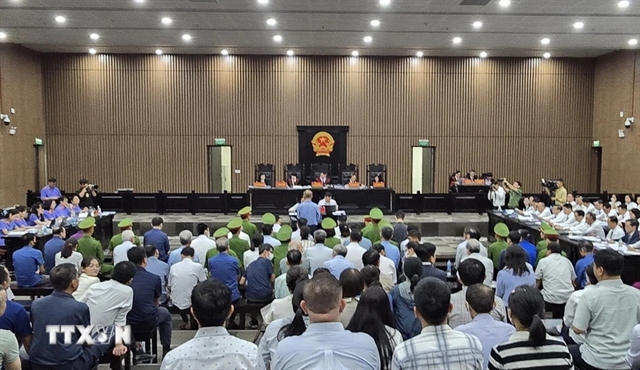 Society
Society


|
| Defendants appear in court on Friday. — VNA/VNS Photo |
HÀ NỘI — Prosecutors on Friday proposed a 30-year prison term for Nguyễn Văn Hậu, chairman and CEO of Phúc Sơn Group JSC, at the high-profile trial of 41 defendants involved in the corruption case related to the firm.
Accordingly, Hậu faces 17–18 years in prison for giving bribes; 15–16 years for violations of bidding regulations, causing serious consequences; and 11–12 years for violations of accounting regulations, causing serious consequences. The combined sentence recommended for him totals 30 years.
Earlier, on Thursday hearing, Hậu acknowledged that the indictment from the Supreme People's Procuracy, which charged him with the three offences, is accurate and fair. He also admitted to unlawfully gaining VNĐ1.16 trillion (US$44.37 million).
Former Secretary of Vĩnh Phúc Provincial Party Committee Hoàng Thị Thúy Lan was proposed 14-15 years in prison; while Lê Duy Thành, former Chairman of the Vĩnh Phúc Provincial People's Committee, would spend 9–10 years in prison, and Phạm Hoàng Anh, former standing deputy secretary of the provincial Party Committee, would get a jail term of 7 to 8 years.
Hoàng Thị Thúy Lan, in her capacity as secretary of the Vĩnh Phúc Provincial Party Committee, was accused of receiving VNĐ25 billion and $1 million in bribes from Hậu in exchange for steering key decisions in favour of Phúc Sơn.
These included approvals for project bidding, establishing Thăng Long Company as a project developer, and artificially lowering land valuations for a wholesale market project. These actions caused state losses exceeding VNĐ200 billion ($7.7 million).
Lê Duy Thành allegedly received VNĐ20 billion and $1.3 million from Hậu on four separate occasions. In return, Thành facilitated Hậu’s real estate development plans, notably the controversial wholesale market project that resulted in significant state asset depletion.
Phạm Hoàng Anh allegedly accepted VNĐ400 million and $20,000 in bribes from Hậu. Hoàng Anh then used his position to ensure that Thăng Long company retained its project rights, shielding the company from regulatory penalties or revocation.
Other defendants, including former officials and business executives, would receive sentences ranging from suspended terms to up to eight years in prison on various charges such as violating accounting and bidding regulations, receiving bribes, abuse of power while performing official duties, and abuse of influence over public officials for personal gain.
Prosecutors said from 2010 to 2023, Hậu and his accomplices carried out a range of serious offences in Vĩnh Phúc, Phú Thọ, Quảng Ngãi, and Vĩnh Long provinces. These violations included bribery, abuse of power, manipulating bidding processes, falsifying accounting records, and profiting from influence over officials.
To secure key real estate and infrastructure projects in Vĩnh Phúc and Quảng Ngãi, Hậu allegedly met and handed bribes to provincial leaders and officials to get project approval and contractor selection.
According to the indictment, the man personally disbursed VNĐ132 billion (including VNĐ72.5 billion and $2.62 million) in bribes to secure projects for Phúc Sơn Group and its subsidiary Thăng Long Investment, Trade and Real Estate JSC Company.
On charges of violating bidding regulations, prosecutors said Hậu instructed Phạm Ngọc Cương, deputy general director of Phúc Sơn Group, along with other employees, to collude with project owners during the bidding and evaluation process.
To manipulate the outcome, Hậu directed the use of three shell companies - Tự Lập, Miền Trung, and Yên Lạc - as collusive bidders to create the illusion of competition while ensuring that Phúc Sơn won the contracts.
After securing contracts, Hậu illegally transferred them to other entities for a profit, causing the state to suffer losses exceeding VNĐ459 billion.
Regarding violations of accounting regulations, prosecutors said Hậu operated dual accounting systems to hide revenue and evade taxes.
These systems tracked off-the-books payments from clients involved in real estate projects run by Phúc Sơn and Thăng Long companies in Vĩnh Phúc.
The group allegedly falsified financial records, manipulated land transactions, and concealed income to avoid tax obligations, enabling Hậu to finance illegal business activities and use funds for personal gain.
These accounting irregularities alone led to an estimated VNĐ504 billion ($19.3 million) in state losses, in violation of Vietnam’s Accounting Law, Tax Administration Law, and other relevant legal provisions. — VNA/VNS




